should用法归纳与练习
Should与Ought to的讲解和练习

Should与Ought toI. 复习1. Some people can live without meat.2. May I use the phone please, Mr. White?3. Could you tell me something about the book?4. You must not smoke here.5. What flavor would you like, chocolate or strawberry?6. We should put rubbish in the bin.7. She shouldn’t discuss it.8. Should we discuss it now? / Ought we to discuss it now?-- Yes, we should/ ought to. -- No, we shouldn’t/ ought not to.9. The students ought not to sleep in the class.10. Tom ought to hand in his homework on time.II. 二者区别:时态Should Ought to 肯定句sb. should do sth. sb. ought to do sth.否定句sb. should not do sth. sb. ought not to do sth. 一般疑问句Should sb. do sth.? Ought sb. to do sth.?简略回答Yes, sb. should do sth.No, sb. should not / shouldn’t do sth.Yes, sb. ought to do sth.No, sb. ought not /oughtn’t to do sth.should和ought to在用法上要注意以下3点:1.没有人称和数的变化。
英语中should的用法归纳

英语中should的用法归纳一、Should 表示过去将来时,即从过去观点看将来要发生的是,多用于间接引语中。
We thought that we should never see you again. 我们想我们再也看不到你了。
The BBC weather report this morning said that we should have rain.今天早上,BBC电台天气报告说,今天有雨。
二、Should 表示义务、责任、常译为“应当”,“应该”,或表示一种估计的情况,译成“按理应当”,“估计......”。
Why should I pay him?为什么我该付给他钱?They should be there by now,I think. 我估计,他们现在到那儿了。
Should 用于完成时态,表示对过去发生的动作的一种推测,译成“应该已经......”。
You should have washed the wood. (But you haven't.)你应该把伤口清洗了。
(然而你没有)三、Should 用于虚拟语气中。
(1)用于It is necessary (important,strange.。
that.。
)中,在美国英语中should 常省去。
It is important that we (should)learn English well. 我们学好英语很重要。
(2)用于It is ordered (suggested)that.。
中,而在美语中should常省去。
It is decided that we (should)finish our work in a week.决定我们要在一周之内完成我们的工作。
(3)用于表示命令、请求、建议、决定等词后面的宾语从句中,在美国英语中should常省去。
He wrote,suggesting that Mr. Wang (should)come to Beijing. 他信中建议王先生到北京来。
(完整版)情态动词should的用法专项练习
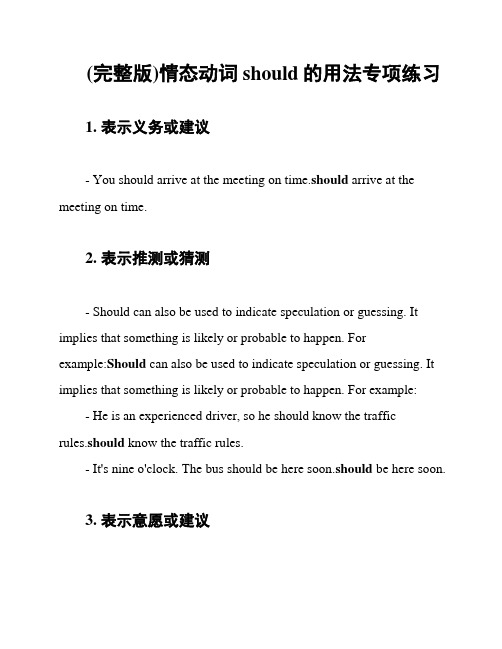
(完整版)情态动词should的用法专项练习1. 表示义务或建议- You should arrive at the meeting on time.should arrive at the meeting on time.2. 表示推测或猜测- Should can also be used to indicate speculation or guessing. It implies that something is likely or probable to happen. Forexample:Should can also be used to indicate speculation or guessing. It implies that something is likely or probable to happen. For example: - He is an experienced driver, so he should know the trafficrules.should know the traffic rules.- It's nine o'clock. The bus should be here soon.should be here soon.3. 表示意愿或建议- I should go to the gym more often.should go to the gym more often.- You should see a doctor if you have a persistent cough.should see a doctor if you have a persistent cough.4. 与条件句连用- If it rains tomorrow, we should stay indoors.should stay indoors.- Should you need any assistance, please don't hesitate to contact us.5. 句型结构- When using should, there are a few sentence structures to keep in mind:should, there are a few sentence structures to keep in mind: - Affirmative: subject + should + base verb should + base verb- You should eat more vegetables.should eat more vegetables.- Negative: subject + should not + base verb / subject + shouldn't + base verb should not + base verb / subject + shouldn't + base verb - You should not waste food.should not waste food.- Children shouldn't play with fire.shouldn't play with fire.- Interrogative: Should + subject + base verb?Should + subject + base verb?- Should I call him back?Should I call him back?6. 注意事项- Avoid using should too frequently in writing. Overuse can make writing seem repetitive. Instead, vary your language by using synonyms like "ought to," "could," or "might".should too frequently in writing. Overuse can make writing seem repetitive. Instead, vary your languageby using synonyms like "ought to," "could," or "might".- The use of should may differ in formal and informal contexts, sobe mindful of the tone and register of your writing.should may differ in formal and informal contexts, so be mindful of the tone and register of your writing.以上是情态动词should的一些常见用法示例。
should用法归纳与练习hbetter

should用法归纳一、Should 表示义务、责任、常译为“应当”,“应该”,或表示一种估计的情况,译成“按理应当”,“估计......”;Why should I pay him 为什么我该付给他钱They should be there by now, I think. 我估计,他们现在到那儿了;二、用于成语中I should like to......“我想做......”I should like to ask the teacher a question. 我想问老师一个问题;三、shouldn’t :不应该表示责备;应该不,应该没有表示推测;如:You shouldn't be so lazy.你不应该这么懒惰;There shouldn't be any problem with your listening.你的听力应该没有问题了;用should 或shouldn't 填空;1. All of us ________study hard and learn English well.2. As a student, you_______ eat in class.3. You _______speak to your parents like this ,you must be polite 有礼貌4. You __________eat less and take more exercise if want ot be healthier and stronger.5. My mother is very tired after work, I________ do some housework for her.had better常简略为'd better是一固定词组,had better"最好",用于表示对别人的劝告、建议或表示一种愿望;其用法有以下几点:一、had better后面必须跟动词原形;had better后跟动词原形即不带to的不定式,构成had better do sth.句型;这里的had不能用have来替换;如:You'd better go to hospital at once.你最好立即去医院看病;Tom, you'd better go there today.汤姆,你最好今天去那儿;二、主语不论是第几人称,句子不论是什么时态,都要用had better 的形式;如:Now youhe,we had better listen to the teacher.你他,我们现在最好听老师讲;三、had better的否定式;如:常用的否定形式是将否定副词not直接放在had better的后面;如:You had better not miss the last bus.你最好不要错过末班公共汽车;You had better not leave for Nanjing the day after tomorrow.你最好后天不要动身去南京;注意:否定副词not绝不能放在had的后面;如:不能说:You hadn't better go.而应该说:You had better not go.四、在祈使句中,had有时可以省略;如:Better not do it .最好别做那事;Better not wait for them.最好不要等他们;五、had better在表示对别人劝告、建议时,不宜用于与陌生人、长辈及上级的交谈中;对长辈说话时,最好不用had better;比较有礼貌的说法是:It might be better for you...;It would be better for you...;如:It might be better for you to help me,Grandpa.爷爷,您最好能帮我一下;练习下列各句都有一处错误,请改正;'d better to wait for me at the school gate.have better write to him now.had not better go there.。
should的用法小学动词
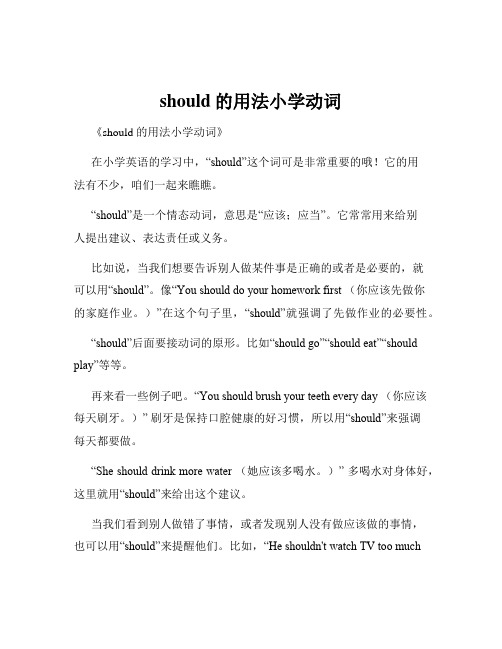
should的用法小学动词《should 的用法小学动词》在小学英语的学习中,“should”这个词可是非常重要的哦!它的用法有不少,咱们一起来瞧瞧。
“should”是一个情态动词,意思是“应该;应当”。
它常常用来给别人提出建议、表达责任或义务。
比如说,当我们想要告诉别人做某件事是正确的或者是必要的,就可以用“should”。
像“You should do your homework first (你应该先做你的家庭作业。
)”在这个句子里,“should”就强调了先做作业的必要性。
“should”后面要接动词的原形。
比如“should go”“should eat”“should play”等等。
再来看一些例子吧。
“You should brush your teeth every day (你应该每天刷牙。
)” 刷牙是保持口腔健康的好习惯,所以用“should”来强调每天都要做。
“She should drink more water (她应该多喝水。
)” 多喝水对身体好,这里就用“should”来给出这个建议。
当我们看到别人做错了事情,或者发现别人没有做应该做的事情,也可以用“should”来提醒他们。
比如,“He shouldn't watch TV too much(他不应该看太多电视。
)” 这里“shouldn't”是“should not”的缩写形式,表示“不应该”,提醒他看电视太多是不好的。
“should”还可以用在疑问句中呢。
比如,“Should I go to school today? (我今天应该去上学吗?)” 这时候就是在询问别人自己是否应该做某件事。
在回答“should”开头的疑问句时,常用“Yes, you should (是的,你应该。
)”或者“No, you shouldn't (不,你不应该。
)”小朋友们在使用“should”的时候,要注意根据具体的语境和想要表达的意思来用哦。
should用法归纳及练习
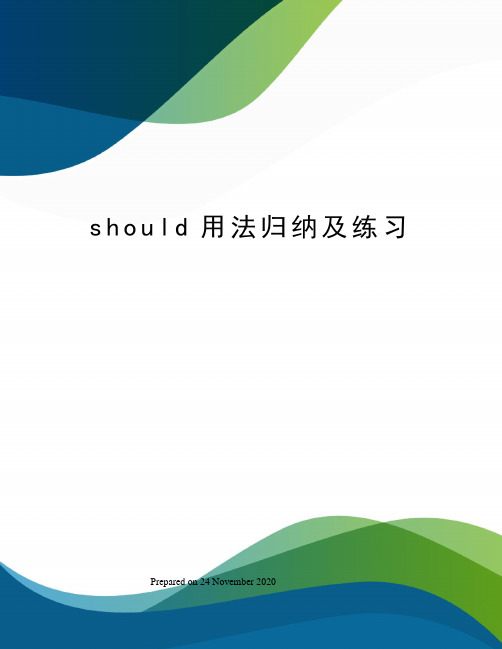
s h o u l d用法归纳及练习 Prepared on 24 November 2020should用法归纳及练习一、Should 表示过去将来时,即从过去观点看将来要发生的事,多用于间接引语中。
We thought that we should never see you again. 我们想我们再也看不到你了。
The BBC weather report this morning said that we should have rain.今天早上,BBC电台天气报告说,今天有雨。
二、Should 表示义务、责任、常译为“应当”,“应该”,或表示一种估计的情况,译成“按理应当”,“估计......”。
Why should I pay him 为什么我该付给他钱They should be there by now, I think. 我估计,他们现在到那儿了。
Should 用于完成时态,表示对过去发生的动作的一种推测,译成“应该已经......”。
You should have washed the wood. (But you haven‘t.) 你应该把伤口清洗了。
(然而你没有)三、在某些从句中,should 表示惊异、意外等情绪,常译为“竟然”。
It seems unfair that this should happen to me.真不公平,这件事竟然发生在我身上。
四、当陈述部分含有ought to ,其反意疑问句部分,美国英语中用should .She ought to stay here, shouldn't her她该留在这儿,是吗五、用于成语中I should like to......“我想(做)......”I should like to ask the teacher a question. 我想问老师一个问题。
六、"should (not) +have+过去分词(done)" 对已发生的事表示遗憾或责备,表达"本该或不该"之意。
should的特殊疑问句用法及回答
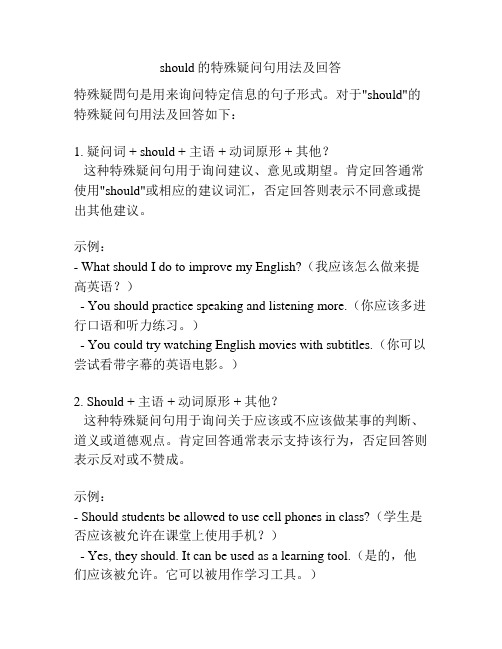
should的特殊疑问句用法及回答特殊疑問句是用来询问特定信息的句子形式。
对于"should"的特殊疑问句用法及回答如下:1. 疑问词 + should + 主语 + 动词原形 + 其他?这种特殊疑问句用于询问建议、意见或期望。
肯定回答通常使用"should"或相应的建议词汇,否定回答则表示不同意或提出其他建议。
示例:- What should I do to improve my English?(我应该怎么做来提高英语?)- You should practice speaking and listening more.(你应该多进行口语和听力练习。
)- You could try watching English movies with subtitles.(你可以尝试看带字幕的英语电影。
)2. Should + 主语 + 动词原形 + 其他?这种特殊疑问句用于询问关于应该或不应该做某事的判断、道义或道德观点。
肯定回答通常表示支持该行为,否定回答则表示反对或不赞成。
示例:- Should students be allowed to use cell phones in class?(学生是否应该被允许在课堂上使用手机?)- Yes, they should. It can be used as a learning tool.(是的,他们应该被允许。
它可以被用作学习工具。
)- No, they shouldn't. It can be a distraction and disrupt the learning environment.(不,他们不应该被允许。
它可能会分散注意力和干扰学习环境。
)请注意,以上回答只是基于常见情况。
具体的回答可能因具体语境和个人观点而有所不同。
初二情态动词should练习题
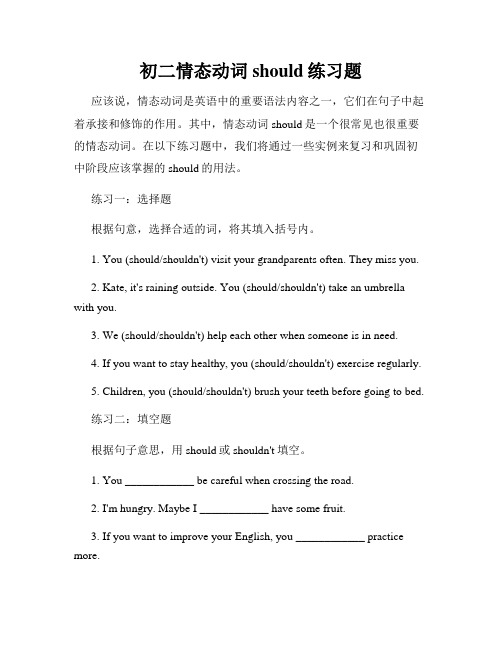
初二情态动词should练习题应该说,情态动词是英语中的重要语法内容之一,它们在句子中起着承接和修饰的作用。
其中,情态动词should是一个很常见也很重要的情态动词。
在以下练习题中,我们将通过一些实例来复习和巩固初中阶段应该掌握的should的用法。
练习一:选择题根据句意,选择合适的词,将其填入括号内。
1. You (should/shouldn't) visit your grandparents often. They miss you.2. Kate, it's raining outside. You (should/shouldn't) take an umbrella with you.3. We (should/shouldn't) help each other when someone is in need.4. If you want to stay healthy, you (should/shouldn't) exercise regularly.5. Children, you (should/shouldn't) brush your teeth before going to bed.练习二:填空题根据句子意思,用should或shouldn't填空。
1. You ____________ be careful when crossing the road.2. I'm hungry. Maybe I ____________ have some fruit.3. If you want to improve your English, you ____________ practice more.4. You ____________ stay up late. It's not good for your health.5. Jack, you ____________ turn off the lights before leaving the room.练习三:改错题找出并改正下列句子中使用should或shouldn't的错误。
should用法归纳与练习had better知识讲解

should用法归纳一、Should 表示义务、责任、常译为“应当”,“应该”,或表示一种估计的情况,译成“按理应当”,“估计......”。
Why should I pay him? 为什么我该付给他钱?They should be there by now,I think. 我估计,他们现在到那儿了。
二、用于成语中I should like to......“我想(做)......”I should like to ask the teacher a question. 我想问老师一个问题。
三、shouldn’t :不应该(表示责备);应该不,应该没有(表示推测)。
如:You shouldn't be so lazy.你不应该这么懒惰。
There shouldn't be any problem with your listening.你的听力应该没有问题了。
用should 或shouldn't 填空。
1. All of us ________study hard and learn English well.2. As a student, you_______ eat in class.3. You _______speak to your parents like this ,you must be polite (有礼貌)4. You __________eat less and take more exercise if want ot be healthier and stronger.5. My mother is very tired after work, I________ do some housework for her.had better(常简略为'd better)是一固定词组,had better"最好",用于表示对别人的劝告、建议或表示一种愿望。
should用法归纳

should用法归纳“should”在英语中是一个非常有用的情态动词,它可以表示义务、责任、劝告、建议等含义。
以下是对其用法的一些归纳:1. 表示义务或责任:在这种语境下,“should”可以用于表示某种行为是出于法律、道德或伦理的要求,有义务或责任去完成。
例如:“You should respect the rights of others.”(你应该尊重他人的权利。
)2. 表示劝告或建议:当“should”用于提出建议或劝告时,它通常基于个人的判断或经验,认为某件事情是可取的或更好的。
例如:“In my opinion, you should choose this option.”(我认为,你应该选择这个选项。
)3. 表示推测或期望:在某些情况下,“should”可以用于表示对未来事件的期望或推测,尤其是在表达个人观点时。
例如:“They should win the game.”(他们应该会赢得比赛。
)4. 用于虚拟语气:“should”也可以用于构成虚拟语气,表达与现实相反的情况或假设条件。
例如:“If I should be elected, I would serve my constituents well.”(如果我当选,我会为我的选民服务得很好。
)5. 表示谦逊或礼貌:在某些情况下,“should”可以用于表示谦虚或礼貌,例如:“I should like to thank you for your help.”(我想感谢你的帮助。
)总的来说,“should”是一个非常灵活的词语,其用法取决于具体的语境和说话者的意图。
正确地使用“should”可以帮助我们更准确地表达自己的想法,同时也能更好地理解别人的意思。
should用法总结

• should的基本用法 • should的虚拟用法 • should的强调用法 • should的特殊用法 • should与其他情态动词的辨析
目录
Part
01
should的基本用法
表示推测
总结词
表示对未来情况的推测
详细描述
should + 动词原形,常用于表示 对未来情况的推测,主语通常为 第三人称单数。
示例
He should arrive at the airport tomorrow.(他明天应该会到达 机场。)
表示义务或责任
总结词
01
表示某种义务或责任
详细描述
02
should + 动词原形,表示某种义务或责任,强调应该做某事。
示例
03
As a student, you should study hard.(作为一名学生,你应
should与must的区别
强制性
must表示强烈的义务或必要性,语 气比should更为强烈,强调“必须 ”。
建议性
should则表示建议或推荐,语气相对 温和,强调“应当”。
should与may的区别
权限
may表示允许或可能,通常用于表达某种权限或可能 性,语气较为委婉。
责任
should则表示某种责任或义务,强调应该做某事。
总结词
强调宾语从句中的should
详细描述
在宾语从句中使用should,可以强调宾语 从句中的某个动作或行为应该发生或应该被 执行。例如,“I think you should go to the doctor”强调了去看医生这一行为的必法
should+动词原形
九年级专项练习题情态动词should的正确用法及练习题

九年级专项练习题情态动词should的正确用法及练习题九年级专项练习题情态动词 "should" 的正确用法及练习题情态动词 "should" 是英语中常用的一个辅助动词,用来表达建议、义务、可能性、必要性等不同的情态意义。
正确使用 "should" 对于学习英语的九年级学生来说至关重要。
本文将详细介绍 "should" 的正确用法,并提供一些练习题,以帮助学生更好地掌握这一关键语法点。
**一、"should" 的基本用法**1. **表达建议**:"should" 用于给出建议或意见,常常表示应该做某事。
例如:- You should study for the test if you want to do well.- She should see a doctor if her condition doesn't improve.2. **表达义务**:"should" 也可以表示某种道义或法律上的义务。
例如:- Students should respect their teachers.- We should follow the rules of the road when driving.3. **表达可能性**:有时,"should" 表示某种可能性,尤其在疑问句中。
例如:- Should I bring an umbrella? (可能会下雨吗?)- Should we be concerned about the weather forecast?4. **表达必要性**:在某些情况下,"should" 可以表达必要性或适当性。
例如:- You should wear a helmet when riding a bike for safety.- I should clean my room before guests arrive.**二、常见错误用法**学生在使用 "should" 时常犯一些常见的错误,以下是一些需要避免的错误用法:1. **不必要使用 "should"**:有时学生会过度使用 "should",而使句子显得不自然。
should的语法

should的语法
"should" 是情态动词,用于表示建议、推测、义务、假设或可能性。
下面是一些 "should" 的语法用法:
1. 表示建议:
- 主语 + should + 动词原形
例:你应该多运动。
(You should exercise more.)
2. 表示推测或假设:
- 主语 + should + 动词原形
例:他应该已经到了。
(He should have arrived by now.)
3. 表示义务或期望:
- 主语 + should + 动词原形
例:你应该完成作业。
(You should finish your homework.)
4. 表示可能性:
- 主语 + should + 动词原形
例:他们可能会迟到。
(They should be late.)
5. 在虚拟条件句中:
- 如果从句 (if clause) 使用过去完成时,主句 (main clause) 使用 "should + have + 过去分词"
例:如果我知道,我应该帮助他们。
(If I had known, I should have helped them.)
需要注意的是,“should” 是一个情态动词,因此后面接动词
原形,不需要加上 "-s" 或 "-ed"。
同时,它没有人称和数的变化。
should的用法和例句

should的用法和例句
should的用法和例句如下:
1、情态动词:should表示“应该,应当”,常用来征求别人的意见和建议。
后接动词原形,没有人称和数的变化。
肯定句句型:主语+should+动词原形+其他成分。
例句:You should stop talking.你应该戒烟。
2、命令或者要求:should表示命令或者要求。
否定句句型:主语+should+not+动词原形+其他成分。
例句:You shouldn't talk in class.你不许在课堂上讲话。
3、预测或者可能:should表示预测或者可能。
例句:His schoolbag should be in the classroom.他的书包应该在教室里面。
4、失望、愤怒和惊讶:should有时表示说话人的失望、愤怒和惊讶。
例句:Why should I go?为什么是我去?。
情态动词should和 had better的用法2024年八年级英语寒假培优练(牛津深圳版 )

限时练习:40min完成时间:月日天气:作业06 情态动词should、ought to和had better的用法【要点回顾一】should 的用法Should为情态动词,意为“应该”,后接动词原形,其否定形式为,变为一般疑问句时,should 提到句首。
无人称和数的变化。
其用法如下:(1)表示委婉地提出意见或建议时,意为“应该,应当”。
You should brush your teeth before you go to bed.(2)表示义务,责任时,意为“应该,应当”。
You should help your mother with your housework.(3)表示命令或要求时,语气比较强烈。
You shouldn’t go out at night.【要点拓展】Ought to也可以表示劝告、建议,意为“应该”。
一般情况下,ought to 可以和should 通用,但是ought to 语气更强烈一些。
ought to 的否定式是:My parents are getting older and older. I ought to/ should visit them more often.【要点回顾二】had better 的用法had better 是一个固定短语,意为“最好”,用于表示对别人的劝告、建议或表示一种愿望。
其用法有以下几点:1.had better 后面必须跟动词。
had better 后跟动词原形(即不带to的不定式),构成短语,had不能用have来替换。
You’d better go to hospital at once.Tom, you’d better go there today.2.主语无论是第几人称,无论用什么时态,都要用had better的形式。
Now you/ he/ we had better listen to the teacher.3.had better的否定式:常用的否定形式是将not直接放在had better的后面,即.You had better not miss the last bus.一、单项选择1.You’d better ________ any noise at night.A.make B.to make C.not make D.not to make2.(2022上·广东广州·八年级执信中学校考期末)—You made a mistake. The spelling ________ be “friend”, not “fried”.—Oh, I see. Thanks.A.could B.can C.may D.should3.(2022上·广东广州·八年级广东番禺中学校考期末)You ________ loudly in the library, or you will bother other readers.A.ought not speak B.ought not to speak C.not ought to speak D.ought not speaking4.I think _________ a new dance is not easy. You should _________ it often.A.to learn; to practise B.learning; practice C.learn; practising D.learns; to practise 5.(2023·湖北黄石·统考中考真题)Young Chinese people ________ keep the motherland at heart, aim high, and have their feet firmly on the ground.A.should B.can C.may D.need6.(2023·内蒙古呼和浩特·统考中考真题)In most museums, there is no shouting and no running, and you________ touch anything.A.couldn’t B.can’t C.needn’t D.mustn’t7.(2023·江苏南通·统考中考真题)If a football team wants to enter the World Cup, it ________ become a member of FIFA first.A.may B.must C.can D.might8.(2023·江苏镇江·统考中考真题)The new app about fashion is really free and you ________ pay money for it.A.may B.must C.shouldn’t D.needn’t9.—Mom, could I go out with my friend for dinner?—Certainly, but you ________ finish your homework first.A.can B.could C.may D.should10.You ________ smoke in the office. It’s bad for the health of all the peopl e here.A.should B.had better C.needn’t D.shouldn’t一、完形填空(2022~2023上·广东广州·八年级增城中学校考期末)Do you think hard work always pays off? Here is the story about how I became successful. I’m very smart and I have spent 10 years 11 mechanics (机械学) but I have low education. I always tried my best to make people trust me but failed. I started this year having another factory job with a little 12 pay than my last one. I was making $ 13.50 an hour at my last job and had a hard time living. Though I was paid more, I still lived 13 . However, if you kept on and didn’t run away, you would succeed one day.Three months ago, my neighbor bought a used car. Everyone thought it had some 14 problems and had no idea. After taking a look at it, I said that I would be able to repair it if he could pay me $ 2,000. At last, he was very cheerful at my 15 and told many of his friends I really made it.In about two months more people came to me for working and I was making great 16 . Then one of my customers (顾客) 17 me with another good job that started even higher. It was 18 because I was able to let them believe in me by solving difficult problems. I finally 19 my new life.So everyone, remember not to give up your dream easily because 20 will come to you in the end with your hard work.11.A.learning B.selling C.stealing D.spelling12.A.less B.better C.longer D.smaller13.A.quickly B.warmly C.badly D.happily14.A.famous B.usual C.easy D.huge15.A.words B.smile C.work D.tools16.A.money B.art C.time D.food17.A.mixed B.filled C.compared D.provided18.A.expensive B.educational C.fantastic D.traditional19.A.created B.lost C.shared D.hurt20.A.excitement B.success C.love D.truth二、阅读理解(2022上·广东广州·八年级广州中学校考期末)Do you admire successful people? Do you think they had their success easily? As “Father of Hybrid Rice”, Yuan Longping got over great difficulties and spent his whole life working to reduce world hunger and helping to feed the country with the largest population.Wu Mengchao, the “Father of Chinese Hepatobiliary Surgery”, focused on saving people’s lives for nearly eighty years. He performed more than 16,000 operations (手术) during his life. Holding the knife for such a long time deformed his fingers. Wu once said, “It would be my greatest happiness if I could work at the operating table until my dying day.”In 1969, in order to solve the problem of treating malaria (疟疾), Tu Youyou, a pharmacologist (药学家) took on the job as head of a research team. She and her teammates performed different kinds of experiments. However, the results were disappointing. Instead of giving up, in 1972, they made it! In 2015, she received Nobel Prize.Thomas Edison, the inventor of the light bulb, believed that every failure was a step towards success. He once said, “If I find 10,000 ways something won’t work, I haven’t failed. I am not discouraged, because every wrong try is another step forward.”Sometimes, their success was a surprise, even to themselv es. The famous scientist Alexander Fleming said, “I certainly didn’t plan to revolutionize (变革) all medicine by discovering the world’s first antibiotic (抗生素). But I guess that was exactly what I did.”Some people only became successful after their deaths. Not like Pablo Picasso who became famous and very rich during his lifetime, the artist Vincent V an Gogh only sold one painting all through his life and that was to a friend. But he kept painting and he painted more than 2, 000 artworks in the following ten years. Now his paintings are very popular and they sell for millions of pounds.One thing all these people have in common is sticking to their goals no matter what.21.What do Yuan Longping and Wu Mengchao have in common?A.They succeeded in solving world problems.B.They achieved a lot in the medical field.C.They spent all their lives serving people.D.They are remembered for their happiness.22.Which of the following statements is TRUE?A.Pablo Picasso became famous after his death.B.Vincent Van Gogh painted 2, 001 artworks in his life.C.Thomas Edison tried 10, 000 ways before he invented the light bulb.D.It took Tu Youyou’s team about 3 years to reach their goal.23.How did Alexander Fleming feel about his discovery of the first antibiotic?A.He did n’t fully realize its importance.B.He didn’t plan to study all medicine.C.He knew exactly what his success meant.D.He felt too tired to stay awake.24.What does the writer mainly want to tell us?A.Not everyone can be successful.B.Great achievements ar en’t made naturally.C.The more difficulties, the better.D.Great hopes make great men.三、语法填空(2022~2023上·广东深圳·八年级统考期末)阅读下面短文,在空格处填入一个适当的词或使用括号中词语的正确形式填空。
should的用法精讲(八年级下册U1)

总结词
详细描述
表示建议、推荐、责任 或义务
在现在时态中,should 常用于表达建议、推荐 或责任,也可以表示对 某种行为的义务性要求。 例如,“You should eat a balanced diet to stay healthy.”(你应 该保持均衡饮食以保持 健康。)
表示惊讶、怀疑或不寻 4;时需要注意语气,避免 过于绝对或过于委婉,根据语境选择 合适的语气。
避免混淆
需要区分"should"与"will","can", "may"等其他情态动词的用法,避免 混淆。
05
练习与巩固
选择题练习
题目
You _____ be tired after such a long walk.
当表示需要但不强调建议时,need 更常用,如 "I need to buy a new pair of shoes."
04
should在实际语境中的应用
在日常对话中的应用
提出建议
在建议或推荐时,使用"should" 表示更强烈或更正式的建议,例 如:"You should try this new
将来时态
总结词
表示将来应该做的事情
详细描述
在将来时态中,should常用于表达将来应该做的事情,强调责任或义务。例如, “You should finish your homework before you watch TV.”(你应该先完 成作业再看电视。)
将来时态
总结词
表示对未来情况的推测
详细描述
表达期望
在表达对未来的期望或希望时, 可以使用"should"来强调,例如: "The company should achieve
should用法归纳及练习
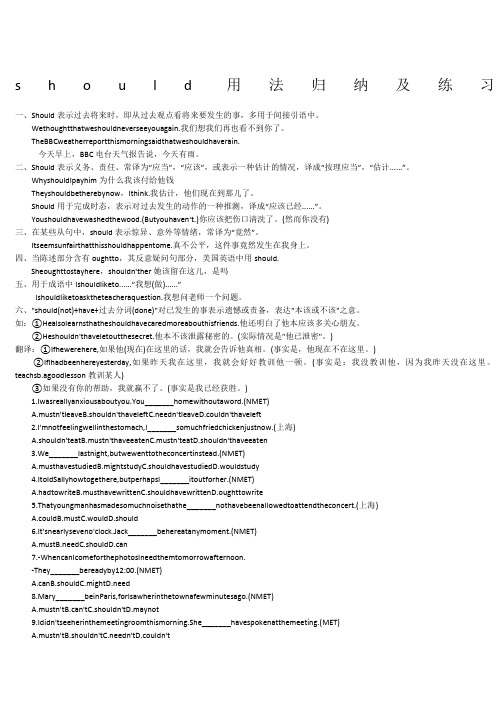
s h o u l d用法归纳及练习一、Should表示过去将来时,即从过去观点看将来要发生的事,多用于间接引语中。
Wethoughtthatweshouldneverseeyouagain.我们想我们再也看不到你了。
TheBBCweatherreportthismorningsaidthatweshouldhaverain.今天早上,BBC电台天气报告说,今天有雨。
二、Should表示义务、责任、常译为“应当”,“应该”,或表示一种估计的情况,译成“按理应当”,“估计......”。
WhyshouldIpayhim为什么我该付给他钱Theyshouldbetherebynow,Ithink.我估计,他们现在到那儿了。
Should用于完成时态,表示对过去发生的动作的一种推测,译成“应该已经......”。
Youshouldhavewashedthewood.(Butyouhaven‘t.)你应该把伤口清洗了。
(然而你没有)三、在某些从句中,should表示惊异、意外等情绪,常译为“竟然”。
Itseemsunfairthatthisshouldhappentome.真不公平,这件事竟然发生在我身上。
四、当陈述部分含有oughtto,其反意疑问句部分,美国英语中用should.Sheoughttostayhere,shouldn'ther她该留在这儿,是吗五、用于成语中Ishouldliketo......“我想(做)......”Ishouldliketoasktheteacheraquestion.我想问老师一个问题。
六、"should(not)+have+过去分词(done)"对已发生的事表示遗憾或责备,表达"本该或不该"之意。
如:①Healsolear nsthatheshouldhavecaredmoreabouthisfriends.他还明白了他本应该多关心朋友。
should造句

should造句最近,学习英语的人们都在热衷于掌握一些基本的口语技巧,尤其是使用should造句。
should在英语中拥有多种用法,它可以用来表达有责任的意思,也可以用来给出建议,对对整个句子的意思和语气有有重大的影响。
在正式开始学习should造句之前,首先要介绍一下他的基本用法。
should作为助动词,可以与任何时态的句子搭配使用,其实它用来表达一种有责任的意思,也就是说,我们应该做某件事,或者有一个义务去做某件事。
比如在下面的句子中:I should go now.should表明我们对自己有一定的责任感,应该现在就出发。
除了表达有责任的意思之外,should还可以用来给出一些建议,就像在下面的句子中:You should study more.should也可以用来表达苦恼,比如:I should have said something.在这里,should表达出建议或者是责备的语气,表明自己应该做出反应,但是没有。
另外,should还可以用来表达一种可能性,比如:He should be here soon.表明这件事情应该很快就会发生。
此外,should还可以用来表达一种虚拟的意思,比如:If I were rich, I should travel around the world.这里的should表明虚拟的可能性,但是表达出自己的期望和愿望。
这就是should的常用用法,我们可以借此来练习一些should的句型,比如:1. We should do our best to protect the environment.2. You should always be honest.3. I should go to bed earlier.4. They should respect each other.5. You should keep your promises.6. He should learn to be more patient.7. You should make good use of your time.8. We should take responsibility for our actions.9. They should focus on their studies.10. He should think twice before making decisions.从以上句式可以看出,should具有多种用法,只要灵活搭配,就可以表达出不同的意思。
- 1、下载文档前请自行甄别文档内容的完整性,平台不提供额外的编辑、内容补充、找答案等附加服务。
- 2、"仅部分预览"的文档,不可在线预览部分如存在完整性等问题,可反馈申请退款(可完整预览的文档不适用该条件!)。
- 3、如文档侵犯您的权益,请联系客服反馈,我们会尽快为您处理(人工客服工作时间:9:00-18:30)。
s h o u l d用法归纳与练
习
Company Document number:WTUT-WT88Y-W8BBGB-BWYTT-19998
should用法归纳
一、Should 表示过去将来时,即从过去观点看将来要发生的事,多用于间接引语中。
We thought that we should never see you again. 我们想我们再也看不到你了。
The BBC weather report this morning said that we should have rain.
今天早上,BBC电台天气报告说,今天有雨。
二、Should 表示义务、责任、常译为“应当”,“应该”,或表示一种估计的情况,译成“按理应当”,“估计......”。
Why should I pay him 为什么我该付给他钱
They should be there by now, I think. 我估计,他们现在到那儿了。
Should 用于完成时态,表示对过去发生的动作的一种推测,译成“应该已经......”。
You should have washed the wood. (But you haven‘t.) 你应该把伤口清洗了。
(然而你没有) 三、在某些从句中,should 表示惊异、意外等情绪,常译为“竟然”。
It seems unfair that this should happen to me.真不公平,这件事竟然发生在我身上。
四、当陈述部分含有ought to ,其反意疑问句部分,美国英语中用should .
She ought to stay here, shouldn't her她该留在这儿,是吗
五、用于成语中I should like to......“我想(做)......”
I should like to ask the teacher a question. 我想问老师一个问题。
六、"should (not) +have+过去分词(done)" 对已发生的事表示遗憾或责备,表达"本该或不该"之意。
如:①He also learns that he should have cared more about his friends.他还明白了他本应该多关心朋友。
②He shouldn't have let out the secret.他本不该泄露秘密的。
(实际情况是"他已泄密"。
)
翻译:①If he were here, 如果他(现在)在这里的话,我就会告诉他真相。
(事实是,他现在不在这里。
)
②If I had been here yesterday, 如果昨天我在这里,我就会好好教训他一顿。
(事实是:我没教训他,因为我昨天没在这里。
teach sb. a good lesson教训某人)
③如果没有你的帮助,我就赢不了。
(事实是我已经获胜。
)
was really anxious about you. You _______ home without a word.(NMET)
't leave 't have left 't leave 't have left
'm not feeling well in the stomach, I _______ so much fried chicken just now.(上海) 't eat 't have eaten 't eat 't have eaten
_______ last night, but we went to the concert instead.(NMET)
have studied study have studied study
told Sally how to get here, but perhaps I _______ it out for her.(NMET)
to write have written have written to write
young man has made so much noise that he _______ not have been allowed to attend the concert.(上海)
's nearly seven o'clock. Jack _______ be here at any moment.(NMET)
can I come for the photos I need them tomorrow afternoon.
-They _______ be ready by 12:00.(NMET)
_______ be in Paris, for I saw her in the town a few minutes ago.(NMET)
't 't 't not
didn't see her in the meeting room this morning. She _______ have spoken at the meeting.(MET)
't 't 't 't
were already five people in the car,but they managed to take me as well.
-It _______ a comfortable journey.(NMET)
't be 't have been 't 't have been
only he _______ quietly as the doctor instructed, he would not suffer so much now.(上海)
lain lie
's hard for me to imagine what I would be doing today if I _______ in love, at the age of seven, with the Melinda Cox Library in my hometown.(上海)
't have fallen not fallen fall to fall
, you _______ play with the knife, you _______ hurt yourself.(NMET 1996)
't; can't 't; may 't; must 't; shouldn't
you coming to Jeff's party
-I'm not sure. I _______ go to the concert instead.(NMET 2000)
left-luggage office is a place where bags _______ be left for a short time, especially at a railway station.(NMET 2003)。
